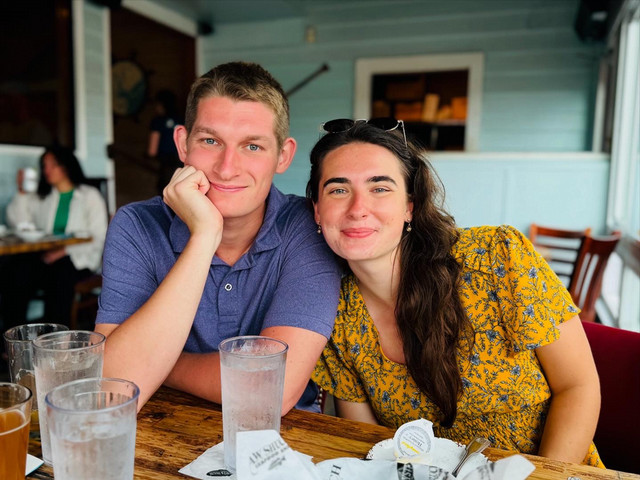
Hannah Barry, MATS ’25, was drawn to Samford University’s Beeson Divinity School by the reputation of former professors Paul House and Allen Ross, both renowned for their expertise in Old Testament and Hebrew.
“I knew I was interested in studying the biblical languages,” said Barry (née Hubin). “I was very interested in Hebrew, especially coming off of my undergraduate capstone.”
Her undergraduate capstone project, All the Wrecked Light, involved putting together an album of music in which each song covered one or two verses of Psalm 90, expounding on the biblical text as it was originally written in Hebrew. Barry met with professors, scholars, and a Messianic Jewish rabbi who helped her get to know the text. After writing the songs, Barry met with musicians to set it to music and, one night, with seven total bands, the album was performed. The album was later produced by one of the musicians.
While Barry participated in commencement this past spring, she added a thesis onto her degree and finished this summer. The thesis focused on Hebrew poetry and the significance of extended metaphors in the biblical text, specifically in Habakkuk.
“There’s a quote, ‘Reading the Bible in translation is like kissing your bride through a veil,’” Barry said. “It’s really easy to have an attitude of reading original languages like it’s a cheat card and it’s so different than our English translations, but it’s not a different book in Greek and Hebrew. Still, there is a nuance that comes from being closer to the text.”
Barry said she loves Hebrew poetry.
“Focusing on biblical poetry has been a great reminder that Scripture is literature. There’s this playfulness to the way it’s written,” Barry said. “It’s artful. When the prophets are communicating something, there’s a winsomeness to the way they’re saying it. It’s enjoyable to read.”
Her work has made a difference in her own Bible reading, teaching her to observe the text as a whole, instead of in bite-size pieces. In Habakkuk, for example, she argues that the prophet sets out with three metaphors as he accuses God. The speeches that commence between Habakkuk and God are an extension of the author’s original metaphors.
“It helps me stay interested in the questions that the text is asking instead of coming to the text with my own questions,” Barry said.
Expanding on that idea, Barry said C.S. Lewis once affirmed it is indeed possible to ask God an impossible question. All “nonsense” questions are impossible to answer, Lewis said. God couldn’t answer whether yellow was square or round, because “that’s not how the world works,” Barry said.
“I wonder if, in some of the theological questions we ask, it’s the same idea,” Barry said. “We need to ask, ‘What are the questions that God is interested in asking and answering?’ Looking at Scripture that way helps me engage with the text.”
While Barry came to Beeson for the languages, she also deeply appreciated the rest of her course of study and the people at Beeson.
“By far, what I’ve loved most about Beeson has been the faculty here,” Barry said.
Barry and her husband Peter, a second lieutenant in the United States Marine Corps, have already moved to Quantico, Virginia, for his continued training. Barry will continue to teach Latin online, something she’s been doing for several years. She plans to read as much as she can and continue translating as she studies.
While she’s unsure if she’ll ever pursue a PhD in biblical poetry, Barry knows she’ll continue engaging with the original languages, a pursuit bolstered by her time at Beeson.
“Whatever I do for the rest of my life, I’m going to be reading Scripture, and being able to read it in Greek and Hebrew is really helpful,” Barry said. “The language work I’ve done here has been foundational. I feel like I can navigate resources and have tools now.”
